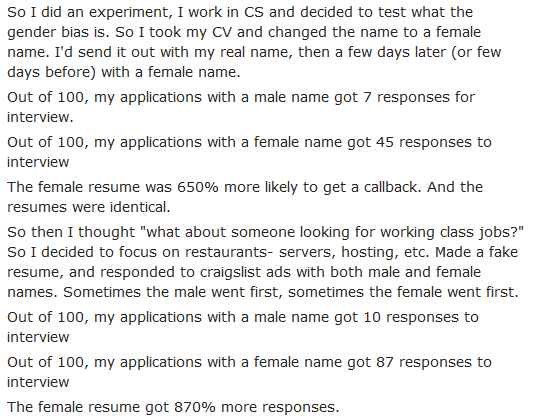Viral "Racism in Academia" Story Deleted When People Started Asking Questions
Do Western names lead to more callbacks than Middle Eastern ones? Heck if I know, but this viral Twitter thread won't get you any closer to the truth
“So I did an experiment, I am looking for a postdoctoral position and decided to check to what extent racism in science could be. I took my CV and changed the name to a more western one. I'd send it out with my real name, then a few days later (or before) with the western name.”
So began a viral Twitter thread from Mohamad, a PhD student with a small online presence and a remarkable and troubling story of racial bias in academia. When he applied to a postdoc using his real name, he got seventeen responses to a hundred applications, all negative. Changing nothing but his name, he experienced a remarkable transformation of fortunes: eighty-seven replies, including fifty-four scientists willing to apply for a fellowship with him. Not only that, but he reported harrowing harassment from the universities, with messages like “If we can keep lowering the barrier for entry, science will become a joke.”
The thread exploded in popularity, reaching well over 40000 likes and 10000 retweets. Millions of people saw it. Commenters rushed to extend their sympathies. Professors and researchers encouraged him to publish the experience, called for more implicit bias training in the field, and shared the story as an example of the grim reality academics must deal with. It began to spread around the internet, rising quickly to the front page of Hacker News and elsewhere.
Now the thread is gone, his account is renamed and private, and it looks increasingly likely the whole story was a fabrication.
So what happened? How did the story spread so fast, and what did it take to realize it might be suspicious?
In the replies to the original thread, there were a good handful of confused or uneasy responses, but none of them got much traction. One person pointed out that institutions should notice two copies of a CV with different names. Another asked how he could change his name on the scientific papers that would be included in the application. A third commented that most institutions would require letters of recommendation with others vouching for the individual under their real name.
There were other incongruities. Who would put in the work to send out two hundred applications under two different names, then provide no visible evidence? Who would design a precise experiment like that, with a hundred applications at once, in the middle of a high-pressure academic job search? What’s the likelihood that he could even find a hundred institutions with open postdoc positions exactly matching his niche academic field?
How could the results flip so dramatically, from nothing but rejections to half of the responders eagerly looking to apply with him? And what of the rude remarks? Any academic who harassed him as he described would be committing career suicide and opening themself up for lawsuits as soon as the harassment was publicized.
Look: none of this guarantees something fishy. There could be good answers to any or every one of these questions. But they’re odd, aren’t they? They demand explanations, they demand answers. At the very least, they demand curiosity.
None of these were the smoking gun that made him nuke his whole account, mind. That smoking gun came from a reddit thread shared on /r/MensRights a few days beforehand, pointed out most prominently by Stuart Ritchie:
Take a look at the similarities between the two:
As I was looking at all of this, Mohamad happened to send another tweet:

I was not by any means the first person to notice or ask him about any of these incongruities, but I was in the right place at the right time to ask him immediately after he posted something. I posed a quick question without expecting a response, asking about the similarities between his post and the reddit thread. To my surprise, he responded almost immediately:
I quickly thanked him for his reply; he liked the message. That’s when things got weird.
Within a minute or two, he removed the like on my “thanks” message. Then he deleted his confirmation and hid my question, only a couple of minutes after sending. In rapid succession from there, he locked replies to his original thread, set his account to private, and then nuked the whole thing, deleting the thread and changing his screen name to Arabic and his username to a random string of numbers. The whole affair took less than half an hour after I posed my question to him.
That’s where things stand now. I’m keen to see evidence if Mohamad has it, but in its absence and given his reaction I believe the story should be treated as unambiguously false.
I’m an outsider to the world of academia, without specialized knowledge or experience, but I picked up some of these incongruities as I read the story. Enough to be confused, enough to want to dig deeper. Why did I and and a handful of other contrarians notice the peculiarities where academics in similar fields credulously spread the story?
In short: vibes.
Twitter is not a space that rewards deep dives and careful examination of evidence. You have 280 characters. People just want the right vibes. Does a story sound good? Does it fit with what you want to hear? Does it support your worldview? You have five seconds before your mind moves on, so smash that like button, give a knowing nod, then check out that neat duck video just below on your feed.
I like to think I’m unusually careful about these things. A racism-in-academia story, though? That’s easy. I operate in a counter-cultural milieu, full of people ready to point out that the demand for racism in academia exceeds the supply. It’s a serious issue that people have justifiably strong reactions to. In the cultural moment we live in, people are on high alert. So when a particularly salacious story of racism drops, my instinct is to verify the details. It has the wrong vibes. Others, lacking that instinct, like, express sympathy, and move on.
But for most people, it’s easy enough to find something they don’t care to apply particular scrutiny to as they browse their social media feeds. In this story, many who were immediately suspicious of Mohamad’s story need look no further than the reddit post he plagiarized from:
Did this story happen?
Are you sure?
Does it change anything if I tell you it was first posted two years ago on /r/TrueOffMyChest?
The user says he posted it on his old account, now suspended, and he decided to repost on a new one. I can believe it. The old post died in obscurity. It would be an odd choice for someone random to resurrect it. But even granting that, he provides no real evidence—just a raw assertion that he submitted 200 pairs of resumes and got an amount of callbacks that perfectly confirmed his worldview and the worldview of /r/MensRights posters.
Take a step back again: say each of these stories is true and happened exactly as reported. Say Mohamad really did perform an elaborate experiment with postdoc applications and really did just happen to like the phrasing on a random /r/MensRights post. Say the /r/MensRights poster told his story exactly as it happened.
The only reason you ever heard either of those stories is that they matched the vibes their communities were looking for. Twitter academics are hungry for stories of racism and racial bias. Online men’s rights activists are hungry for stories of misandry and the disadvantages faced by men. If you have results to share that don’t fit those worldviews, those audiences simply will not hear them. Truth is incidental. If one story happens to be demonstrably false, it falls neatly away to be replaced by a flood of others with the right vibes while its correction reaches an audience three orders of magnitude smaller than the story itself.
With all of that in mind, I find myself agreeing with Razib Khan:
Make no mistake—if the story really was false it was a foolish and incendiary thing to post, one that should and likely will carry serious professional consequences. By all appearances, Mohamad jeopardized his career for a bit of Twitter clout, posting a snappy anecdote for his thousand or so followers before watching in a daze as half of Twitter expressed their sympathies and then the whole thing fell apart.
But when it’s not him, it’s someone else. When it’s not false, it’s cherry-picked. When it clashes with your chosen narrative, it simply fades away. You only have so much time and attention, and everything that reaches you is ruthlessly optimized to keep the audience satisfied.
Perhaps, as one commenter says, everyone got what they wanted from this.
In the end, this sort of self-nuke is about the best outcome I could really hope for. Someone with more sinister intent could have dodged my question, ignored people pointing out incongruities, and left the story up to let it keep spreading. Now, no news stories will be written to amplify it further. Nobody will keep the thread in their back pocket to add to a list of stories about racism in academia. No stubborn contrarians need to chase it around the internet begging people to remember that it probably didn’t happen.
All that’s left? A million people nodding vaguely and saying “Oh, yeah, I read something about that once. People with western names get like ten times as many callbacks as others. Hm, can’t find it now. You know how it goes.”
Just the vibes.










One thing I'm surprised isn't getting more commentary, and which might explain the sudden disappearing act, is the source of the article Mohammad admits to having taken much of his wording and format from. It's from a "men's rights" subreddit, as Trace mentioned but doesn't really emphasize. Here Mo is trying, however clumsily, to make a point that's very friendly to the SocJus/Woke (or whatever we're allowed to call it this week, cf https://freddiedeboer.substack.com/p/please-just-fucking-tell-me-what ) memeplex, but he's admitting to drawing inspiration and even wording from an MRA.
Now granted, technically feminism and anti-racism, along with trans rights and other causes that sometimes fly that flag, are separate things, and it's possible in principle to support some of them and not others. But let's be real. The vast majority of the time, these things are encountered as a package deal (the very need for those verboten terms is proof enough). Maybe there's some internal divisions, but they are almost always presented publicly with a united front. There appears to be a very strong expectation by both people in that movement and its audience that people who support one will also (publicly at least) support all the rest.
Indeed, one way to identify people who accept some of these 'isms' and not others is that they - far more than people genuinely on the right who are more clearly their ideological enemies! - are precisely the ones "cancel culture" (yet another term we're apparently not allowed to use) sinks its claws into. Witness JK Rowling, or even Scott. Even with the most solid anti-racist credentials this side of Ibrahim X Kendi, admitting to having MRA sympathies would have put Mohammad into that bucket and been career suicide to at least the same degree as being caught fabricating an experiment like this. Likely as not, he realized this at the last minute, panicked, and burned down as much of the evidence as he could.
Maybe everyone got something they wanted, but at the cost of a perceived world further untethered from reality.
I greatly enjoyed the article, but I think you're being too credulous despite your skepticism: it seems unlikely the post was authored by a genuine academic.